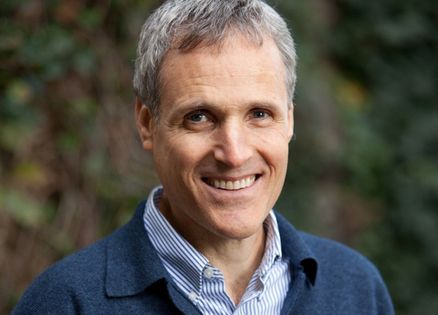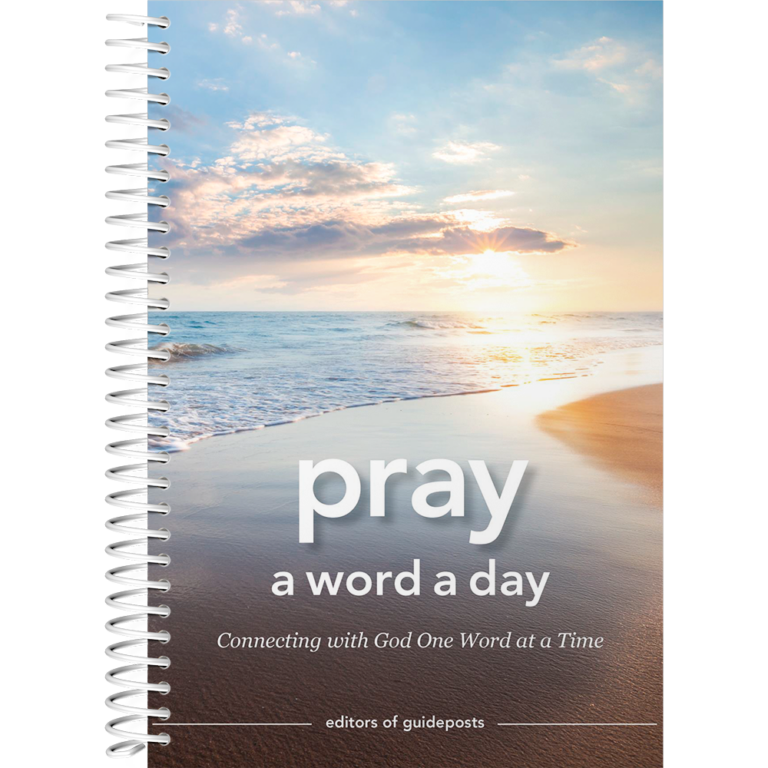Of all the means of prayer, gratitude is one of the easiest. Even people who are not particularly faithful can choose gratitude. At Thanksgiving at our house we usually go around the dinner table and each person mentions something they’re grateful for: good health, great kids, a winning soccer team, the food on our plates, the presidential election, a passing grade in chemistry.
Other virtues can be so much harder to acquire. Tell yourself to be hopeful and if you’re worried sick and biting your fingernails, it’s not going to change your thinking. Tell yourself to be patient and after ten minutes at baggage claim at the airport, looking for your green suitcase among all the black ones, you will be fuming. But “let gratitude be your attitude” is one of those pithy sayings you can actually make happen. It doesn’t take much to train your mind to be grateful. A pen and paper will do.
Several years ago I worked with newscaster Deborah Norville on an article about gratitude. In her three decades as a TV reporter, she observed, “I’ve always marveled that certain people, even in the face of heart-stopping obstacles and the most difficult circumstances, are able to go forward with smiles on their faces and optimism in their outlooks. How is that possible? In each instance, it comes down to the same answer: They were grateful.”
Deborah believes in actually writing down what you are grateful for, keeping track of your blessings in a journal the way you keep track of your checks in your checkbook. She insists it’s good for your career, your family life, your marriage, your well-being, and she offered scientific research to prove it….
Deborah told me about how she used gratitude to combat a health problem. “For years I’ve suffered migraines,” she said. “I’ve done everything every doctor recommended, but after my investigation into gratitude I tried something new. I made a daily habit of writing down the things that made me grateful. And I started seeing the benefits. My migraines have all but disappeared, my energy has increased and I’ve experienced joy by ‘being there’ for others.”
She called it “Thank You Power” and wrote a book with the same name. Her prescription: Write down three things every day that you’re thankful for. Three things was all, duly noted and recorded. “You need to work on it consciously to make a difference,” she said.
Her advice made sense though I was certain it wasn’t anything I needed to follow. I’m a natural optimist. Why did I need to write down what I was thankful for?….
Am I thankful that I had open-heart surgery? Of course. I am thankful to the doctors, thankful that someone figured out I had an aneurysm before it ruptured, thankful to the nurses who took such good care of me. Without surgery I would not be alive. But here’s something a little harder to explain: I’m thankful for the compassion it’s given me for anyone else who goes through the trials of major surgery. Especially the recovery.
Four weeks out of surgery, I crashed. I felt rotten. I would lie in bed shivering under a mountain of quilts, close my eyes in the hope of sleep, and what came to me was a small dark block in my head. Imagine all your deepest fears pressed down and packed together into a domino that’s lodged in your head. You can’t step around it, you can’t ignore it, you can feel its brooding presence and you wonder if it will explode or suck you into endless night. I could almost locate it near my forehead. I started calling it the black domino, all dark blankness and not a single dot of light….
I lay in bed, watching the black domino warily, monitoring it like the enemy. It was the enemy. Was I going to plunge into a bottomless pit of gloom? Was I going off the deep end?….
Was it claustrophobia? I hate being in closed spaces. In my editorial career there is only one story that gave me the creeps so much I couldn’t work on it. It was about a man who went scuba diving through Caribbean coral caves and came to a spot that got narrower and narrower until he couldn’t get out. He couldn’t turn around and he couldn’t figure out the route that would take him back. His air was running out. Through the murky water and the coral he could see sunlight above but couldn’t reach it.
Fortunately for him, he was able to escape, but that remains my worst nightmare. To be trapped. Maybe my body was still objecting to being strapped down on a hospital bed for hours of surgery, a machine doing the work of my heart and lungs.
“But you’re doing all the right things,” I told myself. I walked around the small park near our house three times a day. I took naps. I ate carefully, filling myself up with protein and iron. I had oatmeal for breakfast and lentil soup for lunch. I took prescription painkillers when I had to. Otherwise two Advil at bedtime and another two in the middle of the night.
“I’m not getting better,” I told Carol.
“Give it some time,” she said. “It’s not going to be a straightforward trajectory. You’ll have good days and some bad days—a few steps forward, a few steps back—but you’ll feel better over the long term.”
No reason why that shouldn’t happen. But I couldn’t believe it and I felt myself unalterably changed. The novelty of being a patient had worn off. The adrenaline of surgery was long gone. I was in the deep slough of recovery and I hated it….
I couldn’t pray. I couldn’t reach God. He was that light above me. I could accept that he was there but I couldn’t get to him. This time it wasn’t enough to tell myself that others were praying for me and doing it on my behalf. Not anymore….
I picked up my battered volume of the New Testament and Psalms and complained, “I’m mad at you, God.” I read from a psalm that was full of rage: “Arise, O Lord; save me, O my God, for thou has smitten all mine enemies upon the cheek bone; thou hast broken the teeth of the ungodly.” I thought it could get me in touch with my anger. But it didn’t make me feel any better…
“You’ve talked about wanting to have a sabbatical someday,” Carol said, looking for the upside. “Maybe you can think of this time as your sabbatical.”
A nice thought, but not one I could put into practice. On the ideal sabbatical my head would be clear enough so that I could read through Proust and Tolstoy and Dante, savoring the greats with the greatest mental agility. I wasn’t up to that. I watched old videos and thumbed my way through the books friends had sent me.
I was a dead weight. I couldn’t clean the house or give a dinner party or even do the laundry. About the only challenge I was up for was writing a thank-you note. That I could try. “Just the kind of thing Deborah Norville would have you do,” I thought. I’d emailed her shortly after surgery, just to tell her what I was going through. She’d responded with a generous prayer. But her “thank-you power” advice? That was still on file somewhere in my head.
I sat on the side of my bed and took out a note card. I looked over at the gifts people had sent. There was a bowl my coworker Celeste had given me for my oatmeal, the perfect thing. But why write her? I would see her soon enough back at the office. I could say something then. She wouldn’t be expecting anything from me.
No, I needed to write it down now, all my gratitude. I would forget it in a couple of days. I scrawled a few sentences. At once there was an inner ping, as sure as the clanging of a bell: “Yes, that’s right. That’s you, Rick. That’s who you are. That’s where you want to be.”
I was hungry to be grateful, desperate like a starving man seeking food or a thirsty one crawling across the desert for water. It was almost physical, holding a pen in my hand and opening a blank card, my mind looking for words to describe a kindness. Thankfulness was the one thing that would keep the black domino from sucking me up and absorbing me. Thankfulness expressed in very specific terms.
I wrote another note and another. Thank you for the card, thanks for the roses, thanks for the burritos from FreshDirect, thanks for the bottle of wine, thanks for the friendship, thanks for the postcard that made me laugh, thanks for the CD, thanks for the phone call, thanks for the prayers, thanks for the visit, thanks for the email.
I could hear myself as I wrote. I could feel stirrings of faith even if I was writing nothing about my faith because I was participating again in the goodness of the world. Sitting on the side of my bed and writing was my therapy. Later at church someone said, “I can’t believe you sent me a note thanking me for my note.” How could I say that the note I sent her was vital to my recovery?
Prayer is communication and this was essential communication. Our friend F. Paul had sent me a slew of witty postcards over the last month, every one of them a gem. One day I picked out a dozen of them and made a silly collage of the images to send to him as thanks. Back at ya.
I couldn’t pray the way I was accustomed to, but writing thank-you notes—something so mundane and yet so profound—was my prayer. I could connect to my spiritual core. I could do battle against the inner darkness pulling me down. I could linger in the light.
In a matter of weeks I sent seventy-five thank-you notes and postcards. I hope I never have to read them. I’m sure they were inane or over-the-top or even illegible. But they were a godsend to me. I could wait, pen in hand, and tell myself, “I don’t really have anything to say,” but once I started writing, all sorts of things came out.
Gratitude wasn’t far beneath the surface. It was just waiting to be expressed. I’m amazed that I actually had seventy-five different people to write, seventy-five people who did nice things for me. But once you start looking for things to be grateful for, you end up feeling grateful in the most cosmic way.
For me it was a way to reclaim the turf I longed to inhabit and it kept me from sinking into godless despair. It was many months before the black domino disappeared—I can still conjure it up like a phantom in a Stephen King novel. But I had found the tool to banish it, one I still use.
Be thankful in all things. Write them down. Even if you don’t feel grateful, even if you can’t pray. What you write will be your prayer. Feelings you can’t force, faith is not something you can necessarily talk yourself into, but thankfulness you can. All it takes is a pen or a pencil and a scrap of paper. You can write to yourself, you can write to a friend, you can write to God. Put your gratitude down, even at the worst of times. Especially then. What you say will lift you back up.






